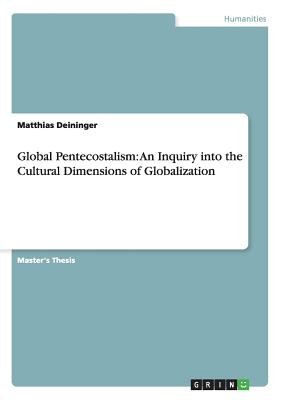
- We will send in 10–14 business days.
- Author: Matthias Deininger
- Publisher: GRIN Verlag
- Year: 2012
- Pages: 112
- ISBN-10: 3656301506
- ISBN-13: 9783656301509
- Format: 14.8 x 21 x 0.7 cm, softcover
- Language: English
- SAVE -10% with code: EXTRA
Reviews
Description
Master's Thesis from the year 2012 in the subject Sociology - Religion, grade: 5.5, University of Bern, language: English, abstract: The birth and rapid global expansion of Pentecostal movements has led to widespread recognition of Pentecostalism as a major force in the Christian globalization enterprise, and a significant subset within the broader globalization movement. A main thread running through the study of global Pentecostalism, therefore, is its adaptability to the modern world system and, concomitantly its increasing visibility in the public sphere. Underlying the assertion of cultural adaptability is the assumption that the world's economic, political, and other societal structures have shifted (and continue to shift), and that Pentecostalism as a religious orientation has the ability to accommodate, or maybe even leverage, those shifts. Rather than just responding to globalization processes Pentecostalism acts on and actively shapes the dynamics of globalization, and thus can be viewed as yet another powerful force in the ‗re-sacralization' or ‗re-enchantment' of the world (cf. Csordas 2011). Put differently, Pentecostalism seems to be ―flexible and resilient enough to adapt to and be at home with both modernity and its elusive successor, post-modernity‖ (Anderson 2004: 285). The central aim of this thesis is to understand Pentecostal ex-pansion within the theoretical framework of globalization and in terms of its internal religious characteristics. In my opinion, Pentecostalism can serve as a heuristic entry point to understand the complexity of cultural globalization processes more generally. With this end in mind and for this purpose, Pentecostalism is regarded as an ac-tive agent of globalization; as a transnational movement characterized by fluidity, innovation, and practicality within the context of an increasingly complex and plural world order, particularly in terms of the wider discourses on globalization.
EXTRA 10 % discount with code: EXTRA
The promotion ends in 19d.16:00:33
The discount code is valid when purchasing from 10 €. Discounts do not stack.
- Author: Matthias Deininger
- Publisher: GRIN Verlag
- Year: 2012
- Pages: 112
- ISBN-10: 3656301506
- ISBN-13: 9783656301509
- Format: 14.8 x 21 x 0.7 cm, softcover
- Language: English English
Master's Thesis from the year 2012 in the subject Sociology - Religion, grade: 5.5, University of Bern, language: English, abstract: The birth and rapid global expansion of Pentecostal movements has led to widespread recognition of Pentecostalism as a major force in the Christian globalization enterprise, and a significant subset within the broader globalization movement. A main thread running through the study of global Pentecostalism, therefore, is its adaptability to the modern world system and, concomitantly its increasing visibility in the public sphere. Underlying the assertion of cultural adaptability is the assumption that the world's economic, political, and other societal structures have shifted (and continue to shift), and that Pentecostalism as a religious orientation has the ability to accommodate, or maybe even leverage, those shifts. Rather than just responding to globalization processes Pentecostalism acts on and actively shapes the dynamics of globalization, and thus can be viewed as yet another powerful force in the ‗re-sacralization' or ‗re-enchantment' of the world (cf. Csordas 2011). Put differently, Pentecostalism seems to be ―flexible and resilient enough to adapt to and be at home with both modernity and its elusive successor, post-modernity‖ (Anderson 2004: 285). The central aim of this thesis is to understand Pentecostal ex-pansion within the theoretical framework of globalization and in terms of its internal religious characteristics. In my opinion, Pentecostalism can serve as a heuristic entry point to understand the complexity of cultural globalization processes more generally. With this end in mind and for this purpose, Pentecostalism is regarded as an ac-tive agent of globalization; as a transnational movement characterized by fluidity, innovation, and practicality within the context of an increasingly complex and plural world order, particularly in terms of the wider discourses on globalization.


Reviews